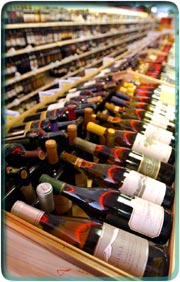Grapes of wrath: Russian wine ban for Georgia, Moldova
Wine flows freely at Genatsvale, one of Moscow 's many Georgian restaurants, as diners tuck into warm cheese bread and quaff glasses of traditional vintages Mukuzani, Kindzmarauli beside a decorative stream that runs through the room. Come May 1, the stream will keep flowing, but the Georgian wines may not, thanks to a ban on imports imposed by Russian health and sanitary officials last week.

"Of course you need sanitary rules. Everyone has them: France , Italy . But to ban all wines from one country like this? It's absurd. It's a fraud," restaurant manager Maria Markoziya said. The ban, which also targets Moldovan wines, threatens to shut down Russia 's billion-dollar market for wines and spirits from the two ex-Soviet republics. It's the latest Russian shot across the bow for the two nations, whose West-leaning policies increasingly irk Moscow .
In the Russian capital, many Georgian restaurants are being allowed to import wines until May 1; wine and liquor stores, however, are already clearing out their stocks or just letting them sell out. "No one's complained yet, but that's just because we still have some on the shelves," said Roman Budkeyevich, a clerk at the Aromatny Mir liquor store, where sweet wines from Ukraine 's Crimean Peninsula now stand on shelves reserved for Georgian reds. "Not for long, though."
Moldova and Georgia were major wine producers during the Soviet period and have struggled to rebuild their wine industries. Both nations are also poor and have bitterly protested the restrictions. "We are up against an effective economic embargo declared against Georgia ," an angry Georgian President Mikhail Saakashvili said earlier this week. Moldovan President Vladimir Voronin said the ban was "gravely affecting the reputation of Moldovan wine, which has been built up over decades."
Russia 's chief epidemiologist, Gennady Onishchenko, announced the prohibition last week, and authorities later said the wines contained pesticides and heavy metals. He later extended the ban to brandy and sparkling wines. "Checks ... continue to be conducted on a large amount of alcoholic beverages produced in Moldova and Georgia ," he wrote in a letter Tuesday to customs officials. "The indicated products do not conform with the requirements of state sanitary and epidemiological rules."
The National Union of Wine and Spirits Producers and Distributors said its analyses showed no dangerous substances in imports from either country and threatened a lawsuit against regulators. "We don't want to be hostages to political intrigues," said Vadim Drobiz, a spokesman for the Russian industry group.
Also muddying the waters are fake or substandard products, as Georgian and Moldovan wines or beverages bearing other labels with gag-inducing qualities regularly appear for sale in Moscow Russia 's largest and wealthiest consumer market. Georgian officials say they have cracked down on false or poor quality wines, and the Russian wine union says most of the counterfeit production comes from Russia itself. From the perspective of Georgia and Moldova , the Russian decision smacks of retaliation for their efforts to move out from under Moscow 's shadow.
Saakashvili's government repeatedly has clashed with Moscow over energy supplies and the status of two Russian-supported breakaway regions, and rattled the Kremlin with its ambition to join NATO and the European Union. Voronin broke with Moscow in 2003 over its staunch support for the separatist Russian-speaking region of Trans-Dniester. That both nations' economies are deeply entwined with Russia 's, however, means they are at the mercy of the Kremlin.
Moldova and Georgia also are heavily reliant on imports of cheap Russian natural gas; Moscow already plans on sharply hiking gas prices for both. For Georgia , a small nation tucked into the Caucasus Mountains and in a strategically important region, wine is arguably its most famous export. Soviet wine connoisseurs blocked from sipping French Bordeaux and Italian Chianti drank Georgian Mukuzanis (dry red), Kindzmaraulis (semisweet) and Mtsvanes (dry white), as well as Moldovan vintages that were renowned enough to be served even at the table of the queen of England.
The Soviet breakup hit the wine industries of both countries hard, and they rely heavily on exports to Russia . Georgia last year sent to Russia 89 percent of the 59.3 million bottles it produced, worth about $62 million (50 million), according to government data. Moldova , meanwhile, sold 80 percent of its wine exports to Russia , about 288 million bottles, estimated at $250 million (204 million), the country's wine export association said. The wines are significantly cheaper than imports from France , Spain , Italy and other countries.
Gheorghe Cozub of the Union of Moldovan Wine Expoters said they were ready to defend their wine in front of Russian specialists. "I guarantee there would be no problems with pesticides and heavy metals," he told The Associated Press, reports the AP.
N.U.
Subscribe to Pravda.Ru Telegram channel, Facebook, RSS!





